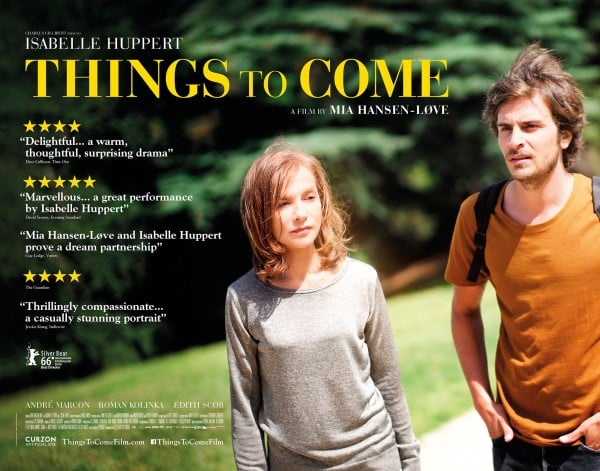
Mia Hansen-Løve has a history of using those closest to her as inspiration for her work: her previous feature, Eden (2014), was partly based on her brother’s experience as a DJ in the French house music scene. Hansen-Løve’s fifth feature focuses on her mother in its study of a high school philosophy teacher, Nathalie (Isabelle Huppert), whose life falls apart when her husband leaves her for a younger woman and her mother dies. A recurring theme in Hansen-Løve’s oeuvre is personal crisis, and how her characters draw on inner reserves of strength to find some measure of self conciliation. Things to Come charts the course of Nathalie’s attempt to eschew the refuge of intellectual fulfilment in favour of embracing life – with all its complexities, disappointments and joys – in the guise of Fabian (Roman Kolinka), a former student and radical writer whose bucolic anarcho-commune she visits post-breakup.
It is striking that Hansen-Løve’s film shares similarities with Something in the Air (2012) in its evocation of the resurgent spirit of unrest and protest typified by the 1968 generation, and Clouds of Sils Maria (2014) in its exploration of the limited space afforded women of a certain age. Both films are directed by Hansen-Løve’s husband, Olivier Assayas, and it is fascinating to see the ways in which the couple’s thematic preoccupations have unconsciously interlaced over the years. Hansen-Løve has a knack for creating naturalistic dialogue without sacrificing narrative clarity, relying on subtlety and subtext to propel her story; with a low-key, actor-focused directorial style grounded in a social-realist tradition.
Of course, it helps to have one of the greatest living screen actors at your disposal, and Huppert delivers an immense, wrenching central performance which occupies almost every frame. Hansen-Løve’s refusal to bend to the demands of exposition frees Huppert to invest the slightest gesture, expression or movement with emotional density and convey character detail. Movement is a big factor in Hansen-Løve’s approach to characterisation, and it is particularly relevant to Nathalie, who uses constant movement as a means of presenting the appearance of momentum in the midst of collapsing stability. Huppert brings to Nathalie a sense of resolve underscored with fragility, a defiant front masking inner wounds.
Things to Come wears its erudition lightly; Hansen-Løve gets under the skin of the film’s academic, intellectual milieu; throwing around names like Adorno, Arendt, Schopenhauer and Žižek without it feeling like red meat for its bourgeois audience. It is one of the film’s great triumphs that Hansen-Løve’s screenplay functions as both a social-realist relationship drama and an astute treatise on contemporary socio-political ferment. Hansen-Løve is by no means an ideological filmmaker, but the relationship between Nathalie and Fabian begins like a discourse between the ’68 and Occupy paradigms and blossoms into a cerebral love affair; with one pining for the other’s historical impetus and the other yearning to recapture that strident certainty and vibrancy. Things to Come approaches a familiar story from a fresh angle, forgoing the standard filmic structure in favour of a novelistic tenor which places an emphasis on character and embraces the inherent messiness of human relations.
Things to Come is a beautifully crafted and quietly insightful portrait of idealism transitioning into something more inward-focusing and resolute; tracing the freedom to challenge entrenched beliefs and steadfast assumptions that comes from losing everything; charting the conflict of ideas and feelings. With great humanity, Hansen-Løve tells a story which avers that desire and a sense of becoming are enough; through it has been criticised for its lack of overt feminist critique, the film’s message of self-possession promulgates a less didactic form of experiential feminism. Things to Come is a work of depth and texture which bespeaks a unique empathy and maturity on the part of its young writer/director. As Hansen-Løve herself has asserted, ‘making films is about the questions, not about the answers.’
Follow Daniel Palmer on Twitter at @mrdmpalmer.
Filed under: Film, TV & Tech
Tagged with: Isabelle Huppert, Mia hansen-løve, Olivier Assaya, Roman Kolinka
Comments